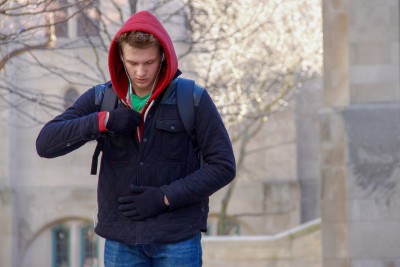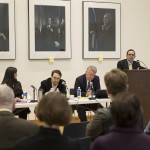
Last weekend brought the folks of New England more than red roses and boxes of chocolates. Record-breaking temperatures and a dangerous wind chill forced many to remain indoors for the majority of the weekend. With the unusually warm winter thus far, the weather was a reality check for many Bostonians and motivated them to break out their fuzzy jackets and snow boots.
The weekend temperatures hit as low as -9 degrees Fahrenheit, according to National Weather Service. This temperature, which occurred Sunday morning, set the record for the fourth-coldest recorded day in Boston, said Rebecca Gould, a meteorologist at the NWS. The chill re-sparked the discussion of global warming.
Gould attributes the cause of these temperatures to the cold air from the North Pole traveling downwards to the Northeast region.
“The wind definitely played a huge role in why it felt so cold, and this was caused by a strong low pressure to the East and a strong high pressure to the West, causing the intense wind in between,” she said.
Michael Dietze, an Earth and Environment professor at Boston University, said the cold temperatures were due to the polar vortex, but doubted that there was a deeper cause to look for.
“By contrast, the anomalously warm winter weather we’ve had up to now, which persisted for months, was caused by primarily by this year’s [El Niño Southern Oscillation] in conjunction with the background global temperatures, which hit a record high in 2015,” Dietze wrote in an email. “Importantly, the presence of a few days of very cold weather does nothing to negate or disprove global warming or the ENSO.”
John Sterman, director of MIT’s Sloan Sustainability Initiative, shared the sentiment, warning about the significance of last weekend’s temperatures.
“Anyone who suggests that the cold this past weekend, in one region of the world, casts doubt on the reality of global warming is mistaking local weather for global climate,” he wrote in an email. “Just a few decades ago, there were many more cold days and much colder temperatures in winter. Now, as a result of global warming, there are far fewer cold snaps and much milder temperatures.”
On the contrary, BU Earth and Environment Professor Anthony Janetos said he believes that these cold temperatures doesn’t just fail to detract from the global warming trend, but confirms it.
“An increasing frequency in these extremes is expected in climate warming,” he said.
Janetos further advised others to think more carefully about the meaning of climate change.
“To ascribe one event to climate change is tricky business,” he said. “It is more significant to determine what are the causal factors to this one event.”
Various student groups at BU have also become concerned about the global warming trend, and even more so with last weekend’s weather.
Rachel Eckles, a junior in the College of Arts and Sciences and student organizer of student-run Divest BU, said members of her group are apprehensive and frustrated about the dangers of climate change.
“Weather is different from climate, and a distinction between the two is crucial,” she said.
Eckles said she is aware that there is not enough proof yet to conclude that the cold temperatures are due to drastic changes in the climate, but explains that there might be a correlation.
“Climatologists and meteorologists believe that the increased frequency of these drastic changes is what proves climate change, along with the fluctuating temperatures from warm to cold that we’ve been experiencing,” she said.
While last weekend did show very frigid temperatures, Sterman considers the cold’s dramatic publicity to be unnecessary, and instead urges people to dress more wisely for the cold.
“The media relentlessly hype a little cold snap as if it were a national crisis,” he said. “If you are poor or elderly you may want to avoid the cold, but for healthy, young people such as college students, it’s time to get out there and enjoy the season.”
However, Gould believes that the media should be used as a vehicle to publicize the cold temperatures, especially for the homeless population.
“It hasn’t been so, so cold in a very long time,” she said. “It is important to get the word out to protect people.”


Nice Job Emily!!